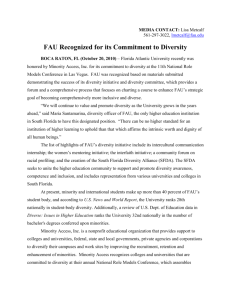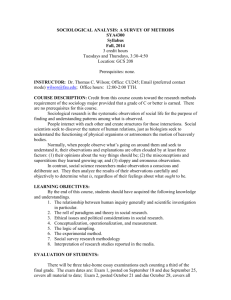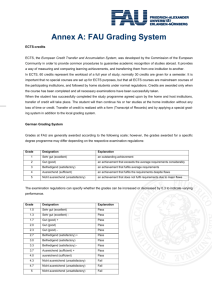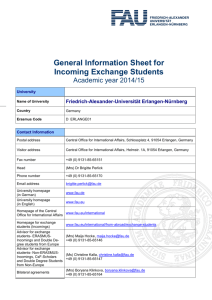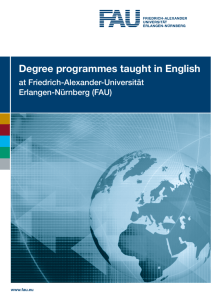MSc Physics MSc Materials Physics
advertisement
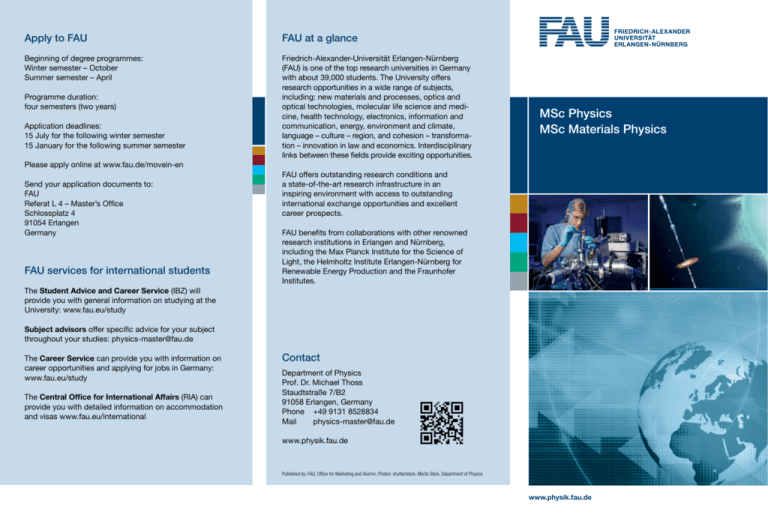
Apply to FAU FAU at a glance Beginning of degree programmes: Winter semester – October Summer semester – April Friedrich-Alexander-Universität Erlangen-Nürnberg (FAU) is one of the top research universities in Germany with about 39,000 students. The University offers research opportunities in a wide range of subjects, including: new materials and processes, optics and optical technologies, molecular life science and medicine, health technology, electronics, information and communication, energy, environment and climate, language – culture – region, and cohesion – transformation – innovation in law and economics. Interdisciplinary links between these fields provide exciting opportunities. Programme duration: four semesters (two years) Application deadlines: 15 July for the following winter semester 15 January for the following summer semester MSc Physics MSc Materials Physics Please apply online at www.fau.de/movein-en Send your application documents to: FAU Referat L 4 – Master’s Office Schlossplatz 4 91054 Erlangen Germany FAU services for international students FAU offers outstanding research conditions and a state-of-the-art research infrastructure in an inspiring environment with access to outstanding international exchange opportunities and excellent career prospects. FAU benefits from collaborations with other renowned research institutions in Erlangen and Nürnberg, including the Max Planck Institute for the Science of Light, the Helmholtz Institute Erlangen-Nürnberg for Renewable Energy Production and the Fraunhofer Institutes. The Student Advice and Career Service (IBZ) will provide you with general information on studying at the University: www.fau.eu/study Subject advisors offer specific advice for your subject throughout your studies: physics-master@fau.de The Career Service can provide you with information on career opportunities and applying for jobs in Germany: www.fau.eu/study The Central Office for International Affairs (RIA) can provide you with detailed information on accommodation and visas www.fau.eu/international Contact Department of Physics Prof. Dr. Michael Thoss Staudtstraße 7/B2 91058 Erlangen, Germany Phone +49 9131 8528834 Mailphysics-master@fau.de www.physik.fau.de Published by: FAU, Office for Marketing and Alumni; Photos: shutterstock, Moritz Böck, Department of Physics www.physik.fau.de Degree programme profiles The Master‘s degree programmes in Physics and Materials Physics provide research-oriented training in highly successful research areas at the Department of Physics in Erlangen. Each of them is a four-semester Master‘s degree programme, comprising two semesters of courses and one-year research part, which is completed with the Master’s thesis. The high-level degree programmes deepen and expand the knowledge and skills developed in a Bachelor’s degree programme. A wide range of specialised lectures is offered to prepare for research work in the Master’s thesis. Degree programme structure and specialisation The Master’s degree programme in Physics builds on the knowledge of physics obtained in a three-year Bachelor’s degree programme in physics or equivalent. The subjects of this degree programme reflect the research foci pursued at FAU with astro- and astroparticle physics, condensed matter physics, biophysics, geometry and quantum gravitation, light – matter interaction, new materials, optics and quantum optics, and physics in medicine. The Master’s degree programme consists of advanced courses and projects, seminars, advanced lab courses and elective courses, as well as a research part ending with the Master’s thesis. The Master’s degree programme in Materials Physics includes advanced solid-state physics, lab courses on experimental methods in solid-state physics, and the option to specialise in a particular research subject leading to the Master’s thesis. Courses on mechanical, electrical, and optical properties of selected materials, soft matter physics, biophysics, theoretical and computer physics, or special aspects of materials engineering and materials chemistry can be chosen. The Master’s thesis for both study programmes can be closely connected to the research conducted by the Cluster of Excellence EAM, the interdisciplinary centres for molecular materials and interface-controlled processes (ICMM, ICICP), and the Max-Planck Institute for the Science of Light (MPL). Core skills Admission requirements The Master’s degree programme in Physics aims to provide advanced training in selected fields of physics, offers the option to specialise, and provides a one-year training phase to develop skills to conduct independent research. The Master’s degree programme in Materials Physics aims to enable students to conduct fundamental research in the area of materials science with a focus on the physical properties of modern materials. The interdisciplinary nature of materials research is reflected in additional courses in engineering or chemistry. Students acquire advanced knowledge in solid-state physics and specialised knowledge in theoretical and experimental physics in their chosen research subject. To be admitted to the Master’s degree programme in Physics or in Materials Physics, applicants must have completed a Bachelor’s degree in Physics, Materials Physics, or a closely related degree programme with a final grade of at least ‘good’ (2.5 according to the German grading system). The B.Sc. must have covered experimental and theoretical aspects of Physics or Materials Physics. Additionally, all applicants have to prove proficiency in English at least at the level of B2 (vantage/upper intermediate) (CEFR) or an equivalent score in another internationally recognised test. Career prospects With the Master’s degree in Physics graduates are well prepared to solve complex problems using independent thinking and well-organised approaches, making them sought-after in industry and academic institutions. With the Master’s degree in Materials Physics graduates will have acquired core skills which allow them to seek employment in research and development at research institutions and in industry. Materials physics is the basis for most innovations in semiconductor or optics industries, or medical engineering. Graduates from both degree programmes can also pursue a doctoral degree in physics or a related discipline.



